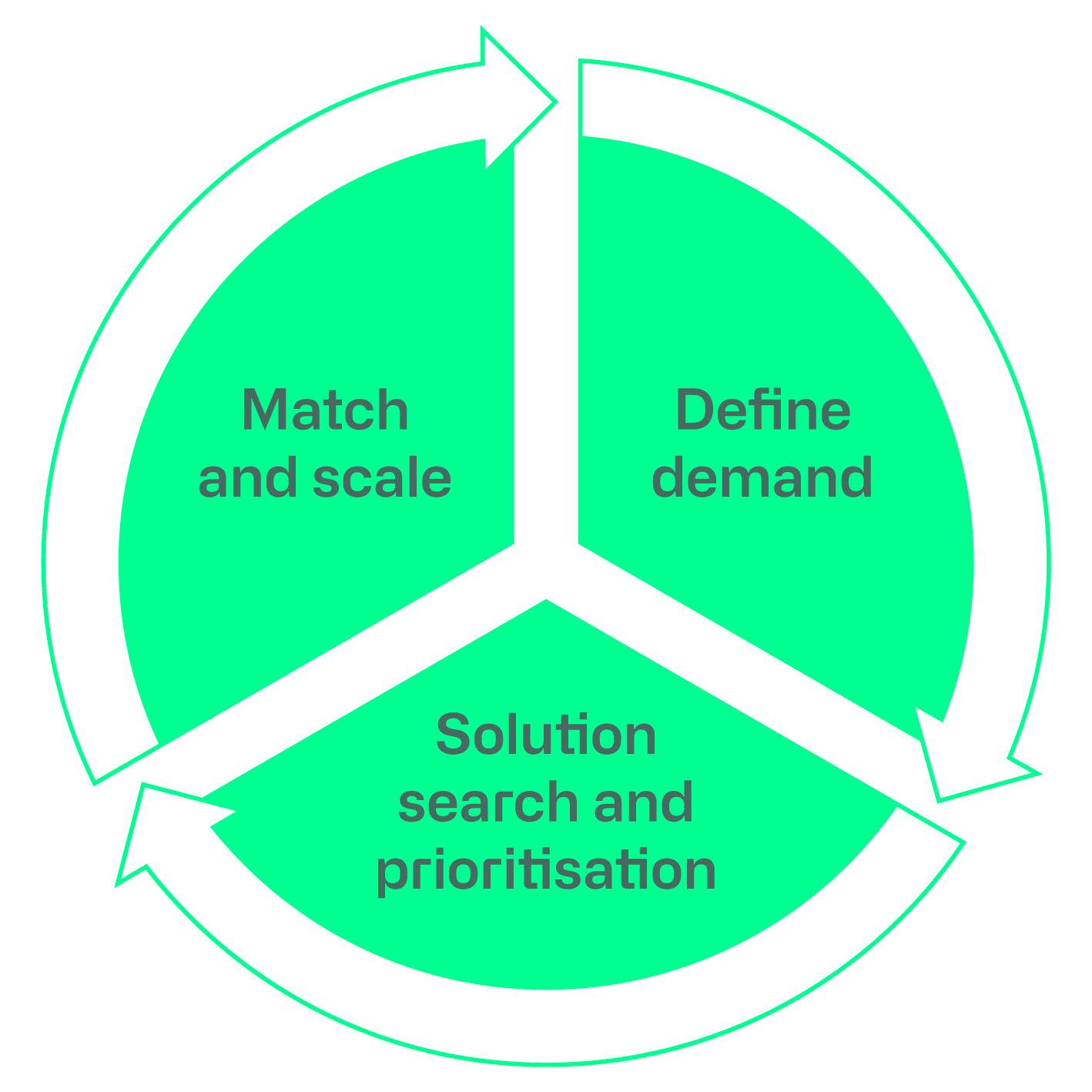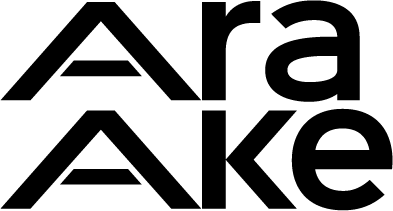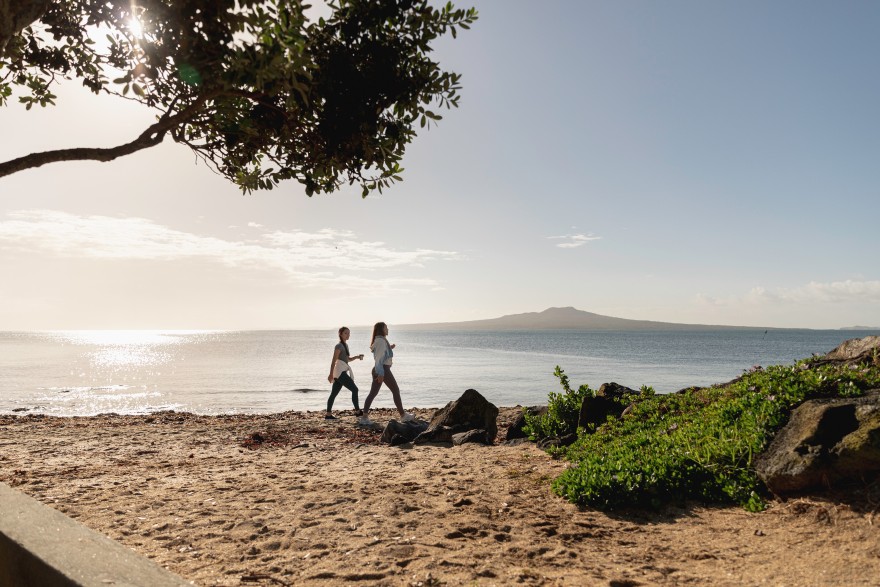
Climate Connect Aotearoa will be running challenges to tackle the key needs of our four focus sectors: Energy, Food, Transport and the Built Environment . To support the delivery of these challenges, we have developed a three-step approach to challenges. Māori-led programmes are in development and may follow a different approach.
Define Demand
A clear demand is crucial for solutions to succeed and scale. At this stage we focus on identifying areas where solutions are needed by conducting research, engaging stakeholders, and using cross-sectoral sprints to articulate demand. We also clarify roles and commitments from the outset to maximise the potential benefits.
Solution Search and Prioritisation
We will work with our networks to identify solutions that can be applied and accelerated. These could be regional, national or international. At this stage we will prioritise by applying key principles and values and screening for wider potential benefits. We will connect solutions with those organisations best placed to support the next stage in their development.
Match and Scale
Match prioritised solutions to demand organisations. Provision of support to scale including links to wider funding and investment, regulation, policy, mentoring, R&D and impact measurement.
Energy Challenge Development, in partnership with Ara Ake

Climate Connect Aotearoa is working with New Zealand’s future energy centre, Ara Ake, to deliver demand-led energy challenges in Tāmaki Makaurau.
Energy is not just electricity. In fact, 66% of Auckland’s energy emissions are from primary fuel combustion within the region, from fuels such as natural gas, coal and liquid petroleum gas (LPG). Energy provides the electricity in our homes, the fuels in our transport system and the heat to manufacture products we use every day.
We know we need to adopt a new, decarbonised energy system that creates good local jobs, improves our health and builds resilience.
We will need to consider challenges across both supply and demand for energy. We need to decarbonise our grid and increase the uptake of decentralised, resilient energy generation. Improved battery storage and energy management will be matched by efficiency in processes and reduced demand.
Food Challenge
Kai (food) is more than just a source of sustenance. In te ao Māori, kai is central to wellness, a source of medicine, and a way of nurturing the spirit and mind (Healthy Families NZ).
However, this is not a reality shared by all. In Aotearoa, many people live with food insecurity. A Ministry of Health (2019) report found that 19% of children in 2015/16 were living in households with severe-to-moderate food insecurity.
As the physical impacts of climate change become more frequent and intense, our food system will face additional and on-going challenges, such as loss of crops due to extreme weather and disruption of supply chains.
Our food system also makes up 18 per cent of our consumption emissions in Auckland, from production, transport, processing and disposal.
In Tāmaki Makaurau, the food-system subsectors include;
- Food product manufacturing
- Wholesale
- Food tech
- Supply chain services
- Horticulture
- Agriculture
- Aquaculture and,
- Fisheries.
A food challenge will require us to address our current food system; to mitigate and adapt to the impacts of climate change; to seek out opportunities that arise through the transition to a low-carbon economy; and in doing so, address the growing food insecurity in our communities.
This will require us to collaborate across sectors, value chains, and communities. We will need to think innovatively and draw on different systems of knowledge from the past and present as we redesign the future of Aotearoa’s food system.
Built Environment Challenge Development, in partnership with Kāinga Ora

How and where we develop, and the performance of our existing and future built environment, are critical factors in determining the success of our climate goals.
Our built environment includes:
- the buildings where we live, work and learn
- the infrastructure systems that enable the region to function
- the urban spaces that shape our city.
The decisions we make when planning, designing and using our built environment determine to what extent we lock in future emissions and our exposure to climate risks. Building materials, construction, maintenance, and demolition are responsible for a growing share of buildings’ carbon footprint, and they make up the largest share of the infrastructure we rely upon daily.
Climate Connect Aotearoa is working with Kāinga Ora to identify some key challenges to the built environment. We will kick off cross-sector demand workshops in 2023, rapidly followed by solutions searches.
Challenge 1: Sustainable timber products - Supporting a significant increase in the proportion of sustainable timber products used in construction activity.
In New Zealand, the built environment contributes 15-20% of the total greenhouse gas emissions, with construction emissions having increased 66% over the last 10 years.
One of the promising solutions for realising such transitions in the built environment lies in the scaled-up use of nature-based products such as sustainable mass timber. Innovative timber construction materials can help substitute materials with a high-carbon intensity, sequester carbon in buildings, and contribute to increasing natural carbon sinks through reforestation and sustainable forestry practices.
Future potential challenge options:
- Transitional parking solutions: How we transition physical parking infrastructure as shifts to other modes increase
- Circular construction materials: Connecting construction sector waste with demand for building materials
- Flexibility in use of spaces and places over time as we address different needs, uses and climate impacts.
Transport and Access Challenge
Transport plays a pivotal role in supporting our society and economy. Transport is our connection to our community services and healthcare facilities, a critical network in disaster response efforts, the backbone of a well-functioning urban environment, and so much more. A net-zero and resilient transport system across Tāmaki Makaurau and Aotearoa will deliver social, economic and health benefits for all.
Transport-related emissions accounted for around 44% of Tāmaki Makaurau’s total emissions in 2016 (Te Tāruke-ā-Tāwhiri – Auckland Council). Our overall emissions profile in transport relate to the carbon-intensity of the energy used to power our vehicles, the lifecycles of vehicles, and the consequences of operating them, including the wear-and-tear of our infrastructure assets.
In our efforts to build a resilient and low-carbon transport system, we need to significantly change how and where we live, how we power our travel, how we move freight around Aotearoa and within our cities, how often we travel, and how we grow our regions. The challenge is to deliver systematic change at speed and scale to achieve the reductions required in our transport emissions, while giving all Aucklanders and New Zealanders’ the access to the co-benefits of a resilient and low-emission transport network.
Climate Connect Aotearoa is currently developing a transport challenge. We’re beginning to discuss what this looks like, the key challenges faced across sectors, and who our partners will be to help deliver transformational change.
Let us know what you see as the key challenges for these four sectors.
